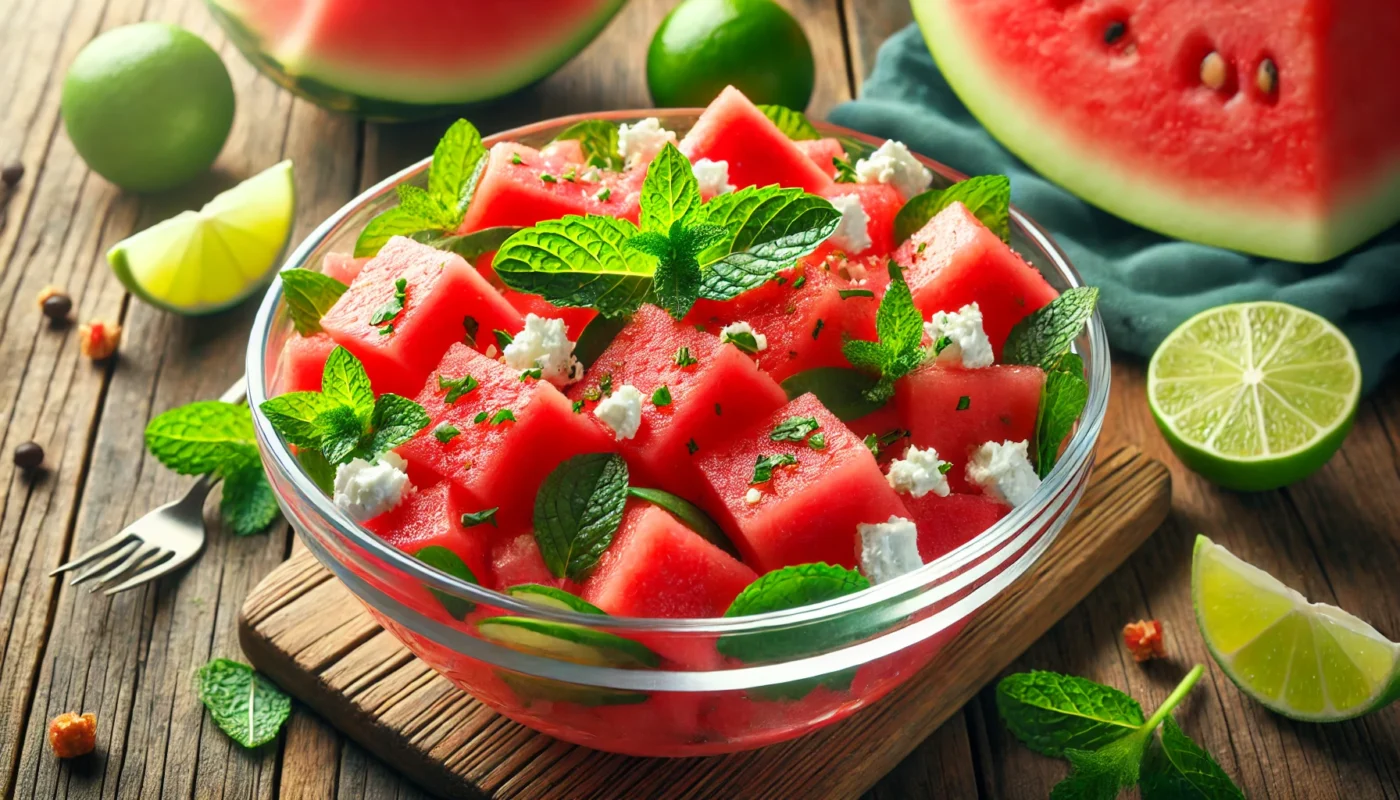Watermelon is more than just a refreshing summer treat. This juicy fruit is a powerhouse of nutrients that can play a significant role in your health.
One of the key benefits of watermelon is its anti-inflammatory properties. Inflammation is a natural response of the body, but when it becomes chronic, it can lead to various health issues.
Watermelon, with its rich array of antioxidants and nutrients, can help combat this. It’s packed with lycopene, a potent antioxidant known for its anti-inflammatory effects.
But that’s not all. Watermelon is also rich in vitamins A, B6, and C, which are crucial for supporting immune function and reducing inflammation.
Moreover, it contains citrulline, an amino acid that can improve blood flow and reduce muscle soreness. This makes it a great choice for fitness enthusiasts looking for natural ways to aid recovery after workouts.
For those managing health conditions related to inflammation, or those simply seeking to optimize their health, incorporating watermelon into their diet can be beneficial.
In this article, we’ll delve into the science behind watermelon’s anti-inflammatory properties, provide practical tips on how to include it in your diet, and explore its role in managing health conditions. Let’s discover why watermelon is nature’s anti-inflammatory powerhouse.
You May Also Like: Do Antioxidants Really Combat Inflammation Effectively?
The Science Behind Watermelon’s Anti-Inflammatory Properties
Understanding the scientific basis of watermelon’s anti-inflammatory effects can enhance our appreciation of this popular fruit.
Watermelon contains several key compounds known for their health benefits. These compounds work synergistically to reduce inflammation and promote overall health.
Let’s break down the primary components that make watermelon such an effective anti-inflammatory food:
- Lycopene: A powerful antioxidant that helps fight inflammation and oxidative stress.
- Vitamins A, B6, and C: Essential for immune system support and reducing inflammatory responses.
- Citrulline: An amino acid that aids in muscle recovery and improves circulation.
- High Water Content: Contributes to hydration, reducing edema and supporting overall bodily functions.
Each of these components plays a distinct role in combating inflammation. The combination of antioxidants, vitamins, and amino acids makes watermelon a comprehensive option for those seeking natural anti-inflammatory strategies.
The interplay of these nutrients ensures that watermelon can be a valuable addition to both prevention and management of inflammation-related conditions.
Lycopene: The Antioxidant Hero
Lycopene is one of the standout nutrients in watermelon. This antioxidant is responsible for the fruit’s vibrant red hue.
Research shows that lycopene can combat oxidative stress, a significant contributor to inflammation. By neutralizing free radicals, lycopene reduces inflammation at a cellular level.
Studies indicate that individuals with higher lycopene intake may have a lower risk of developing inflammation-related chronic diseases. This makes it an essential component of any anti-inflammatory diet.
Vitamins A, B6, and C: Immune Boosting Trio
Watermelon is rich in vitamins that bolster the immune system. These vitamins play critical roles in managing inflammation.
Vitamin A is vital for maintaining healthy tissues and skin, which is the body’s first line of defense against pathogens. This can help reduce the severity of inflammatory responses.
Vitamin B6 aids in the production of immune system cells, while vitamin C is renowned for its ability to combat oxidative stress and reduce inflammation.
Citrulline: Muscle Soreness and Blood Flow
Citrulline is an amino acid found abundantly in watermelon. It has gained attention for its potential benefits in promoting muscle health.
This compound assists in improving blood flow, which can help reduce muscle soreness. This is particularly beneficial after intense physical activity.
Research suggests that citrulline may help athletes and fitness enthusiasts recover more efficiently, helping to reduce exercise-induced inflammation.
Hydration and Edema Reduction
Watermelon is composed of over 90% water, making it excellent for hydration. Adequate hydration is crucial for reducing inflammation throughout the body.
When the body is well-hydrated, it can more effectively manage and reduce fluid retention or edema, which is often linked to inflammation.
Thus, consuming watermelon can aid in maintaining hydration, further supporting the body’s ability to minimize inflammation.

Watermelon in Your Diet: Practical Tips and Recipes
Incorporating watermelon into your diet is both delicious and beneficial. It’s a versatile fruit that can enhance numerous dishes while providing anti-inflammatory benefits.
To maximize its health potential, choose ripe watermelons full of flavor and nutrients. Proper selection and storage ensure you retain its beneficial compounds and enjoy it at its tastiest.
Adding watermelon to your diet doesn’t have to be monotonous. There are various creative and appetizing ways to enjoy this juicy fruit.
Selecting and Storing for Maximum Benefits
Selecting a ripe watermelon is the first step. Look for one with a uniform shape, a creamy yellow spot where it rested on the ground, and a dull, not shiny, rind. This indicates ripeness and flavor.
Once selected, store your watermelon at room temperature to keep it fresh until cut. After cutting, refrigerate it in an airtight container to preserve its flavor and nutrients for up to five days. This practice keeps your watermelon at peak freshness, ensuring you receive the full benefits of its anti-inflammatory properties.
Creative Ways to Enjoy Watermelon
There’s no limit to how you can enjoy watermelon. Start with a classic watermelon salad, combining cubed watermelon, mint, feta cheese, and a splash of lime juice for a refreshing dish.
Try blending it into a smoothie with strawberries and a hint of ginger to elevate its anti-inflammatory powers. This combination not only cools you down but also boosts your vitamin intake.
For a unique twist, grill watermelon slices and sprinkle them with a dash of sea salt and black pepper. Grilled watermelon gains a smoky flavor, adding depth to your palate.
Lastly, consider freezing watermelon chunks for an icy snack or to use in chilled drinks. These can be added to water or iced tea for a refreshing, nutritious boost.
Watermelon’s Role in Managing Health Conditions
Watermelon isn’t just a delightful fruit; it’s a tool in managing various health conditions. Its nutrient profile supports joint, heart, and muscle health.
For arthritis patients, watermelon brings relief through its anti-inflammatory abilities. These benefits extend to other conditions where inflammation plays a key role.
Metabolic syndrome and cardiovascular health are positively impacted by regular watermelon consumption. This fruit aids in managing these conditions through its unique properties.
Athletes also find watermelon beneficial. Its compounds help reduce muscle soreness and speed up recovery after intense exercise.
Incorporating watermelon into your diet can thus address multiple health-related needs. Embracing this approach contributes to a holistic, health-supporting lifestyle.
Arthritis and Joint Health
Inflammation is a major concern for those living with arthritis. Watermelon may alleviate some of these symptoms. It contains antioxidants like lycopene that can help reduce inflammation in joints.
As you include watermelon in your diet, you might notice improved joint mobility over time. This natural approach complements other treatments, offering a tasty and simple dietary addition to support joint health.
Cardiovascular Health and Metabolic Syndrome
Heart health and metabolic syndrome are intertwined with inflammation. Watermelon’s nutrients target these concerns. Lycopene and citrulline in watermelon help maintain proper circulation and blood pressure.
Regular consumption assists in managing cholesterol and blood sugar levels, crucial for those with metabolic syndrome. With its low-calorie content, watermelon supports heart health without adding unnecessary calories.
Post-Exercise Recovery for Athletes
Watermelon aids athletes by easing post-exercise soreness. Its content of citrulline improves blood flow, which helps muscles recover faster.
Consuming watermelon juice before or after workouts can diminish muscle fatigue. This natural remedy supports performance and recovery, making it a favorite among fitness enthusiasts.
Understanding Inflammation and Dietary Impact
Inflammation is a biological response that can protect the body from harm. However, chronic inflammation is linked to numerous diseases. These include arthritis, heart disease, and diabetes.
Your diet plays a crucial role in managing inflammation. Foods rich in antioxidants and anti-inflammatory compounds can counterbalance inflammation. Conversely, processed foods and high sugar intake might aggravate it.
Watermelon is a prime example of an anti-inflammatory food. Its nutrients target inflammation at the cellular level. By incorporating such foods, you can positively impact your body’s inflammatory responses.
Balancing your diet with fruits like watermelon can provide long-term health benefits. It supports both the management of existing conditions and preventative health strategies.
Ultimately, understanding dietary impact on inflammation helps you make informed food choices. This is a vital part of maintaining overall health and wellness.
The Link Between Diet and Inflammation
Diet profoundly affects inflammation in the body. Certain foods can exacerbate or reduce inflammatory responses. By choosing wisely, you manage inflammation and support health.
Diets high in saturated fats and sugars promote inflammation. They increase the body’s inflammatory markers. In contrast, fruits, vegetables, and healthy fats lower these markers.
Eating anti-inflammatory foods helps reduce disease risks. Watermelon, among others, provides the necessary nutrients to fight inflammation naturally. It is a practical component of any anti-inflammatory diet.
Anti-Inflammatory Diets: Where Does Watermelon Fit?
Anti-inflammatory diets focus on whole, nutrient-rich foods. Watermelon fits perfectly into this approach. It offers a combination of antioxidants, vitamins, and hydration.
Incorporating watermelon into your meals can enhance dietary anti-inflammatory effects. This fresh fruit is both versatile and beneficial. It plays a role in both prevention and management of inflammation-related conditions.

Watermelon’s Nutritional Profile and Health Benefits
Watermelon is not just a refreshing summer snack. It is also packed with nutrients that offer health benefits. Its nutrition profile supports both overall wellness and specific health goals.
One of the standout features of watermelon is its hydration power. Composed of about 92% water, it aids in keeping your body hydrated. Staying hydrated is essential for maintaining optimal physiological function.
Watermelon is low in calories, making it a perfect addition to a weight management diet. It provides essential nutrients without excessive calorie intake. This balance is key for anyone looking to reduce body inflammation.
The fruit is rich in vitamins and minerals. These include vitamins A, B6, and C, which bolster the immune system and reduce inflammation. Together, these components help in managing and preventing chronic ailments.
Here’s a list to highlight some of watermelon’s health benefits:
- Enhances hydration and electrolyte balance
- Supports immune health
- Assists in weight management
- Reduces risk of chronic diseases
- Aids in digestive health through dietary fiber
Macronutrients, Fiber, and Glycemic Index
Watermelon is notable for its macronutrient composition. It is primarily made of carbohydrates, which provide energy. The natural sugars in watermelon are balanced by fiber, which aids digestion.
This fruit contains a small amount of protein. While not high, the presence of amino acids like citrulline is significant. Citrulline contributes to muscle recovery and improved blood circulation.
Watermelon’s glycemic index is moderate, which means it doesn’t cause rapid spikes in blood sugar levels. This makes it suitable even for those monitoring blood sugar, as its natural sugars are slower to metabolize.
The Synergy of Watermelon’s Nutrients
Watermelon’s true power lies in the synergy of its nutrients. Lycopene, a potent antioxidant, works alongside vitamins C and A. Together, they create a powerful defense against oxidative stress and inflammation.
This fruit also contains potassium, which supports heart health and muscle function. Its combined nutrients enhance each other’s effects, amplifying the overall health benefits. This nutrient harmony makes watermelon an essential component of a balanced diet.
Potential Risks and Considerations
While watermelon provides numerous health benefits, there are some aspects to consider. Not everyone may experience only positive effects from consuming it. It’s crucial to be informed about potential risks.
For some individuals, watermelon may lead to digestive discomfort. This is often due to its high water and sugar content. Consuming it in large quantities could lead to bloating or diarrhea.
Additionally, while rare, allergies to watermelon can occur. Symptoms may include itching, swelling, or a tingling sensation. If you suspect an allergy, it’s best to consult a healthcare professional.
Allergies, Interactions, and Overconsumption
Allergic reactions to watermelon are uncommon but possible. They may manifest as oral allergy syndrome, where the mouth or throat tingles or swells after consumption. This is more likely in people allergic to other related fruits.
Watermelon may interact with certain medications. Its high potassium content can affect heart rhythm if consumed excessively, especially for those on potassium-sparing drugs. It’s important to manage portion sizes and monitor its consumption closely.
Overconsumption of watermelon may lead to an intake of too much fructose, which can cause digestive distress. Moderation is key to enjoying watermelon without adverse effects. Consulting with a nutritionist can help determine an appropriate amount to include in your diet.
The Bigger Picture: Sustainability and Seasonality
When consuming watermelon, considering its environmental impact is important. Sustainable agricultural practices can greatly reduce the ecological footprint of watermelon farming. Choosing watermelon from farms that prioritize sustainability is beneficial for the planet.
Seasonality also plays a crucial role in the nutritional benefits of watermelon. Locally sourced, in-season watermelon is likely fresher and more nutrient-dense. It has a reduced environmental impact compared to out-of-season imports that require extensive transport.
Choosing Sustainably Grown Watermelon
Opt for watermelon grown with eco-friendly methods. These practices include reducing pesticide use and employing efficient water management strategies. This choice not only supports environmental health but also ensures cleaner produce.
Look for labels indicating organic or sustainably-farmed watermelon. Buying from local farmers’ markets is another great way to support sustainability. This practice reduces carbon emissions associated with transportation and helps local economies thrive. By making these mindful choices, you contribute positively to both your health and the environment.

Conclusion: Integrating Watermelon into a Holistic Health Regimen
Incorporating watermelon into your holistic health routine is both simple and rewarding. Its unique blend of nutrients provides numerous health benefits, ranging from anti-inflammatory effects to hydration. Regular consumption can support general well-being while targeting specific health concerns.
Watermelon complements a wide variety of diets and lifestyles. Whether enjoyed fresh, blended in smoothies, or as part of a salad, it can enhance your dietary intake naturally. By embracing watermelon as part of a balanced lifestyle, you can support both your health and environmental sustainability, creating a harmonious approach to wellness.
Further Reading:
Live Science: Watermelon: Health benefits, risks & nutrition facts
Everyday Health: 10 Foods to Help Beat Rheumatoid Arthritis Inflammation
National Library of Medicine: Watermelon consumption improves inflammation and antioxidant capacity in rats fed an atherogenic diet
health benefits, watermelon, nutrition, anti-inflammatory, hydration, weight management, vitamins, minerals, dietary fiber, glycemic index, antioxidants, sustainable agriculture, seasonal produce, holistic health, digestive health, immune support
Important Note: The information contained in this article is for general informational purposes only, and should not be construed as health or medical advice, nor is it intended to diagnose, prevent, treat, or cure any disease or health condition. Before embarking on any diet, fitness regimen, or program of nutritional supplementation, it is advisable to consult your healthcare professional in order to determine its safety and probable efficacy in terms of your individual state of health.
Regarding Nutritional Supplements Or Other Non-Prescription Health Products: If any nutritional supplements or other non-prescription health products are mentioned in the foregoing article, any claims or statements made about them have not been evaluated by the U.S. Food and Drug Administration, and such nutritional supplements or other health products are not intended to diagnose, treat, cure, or prevent any disease.

